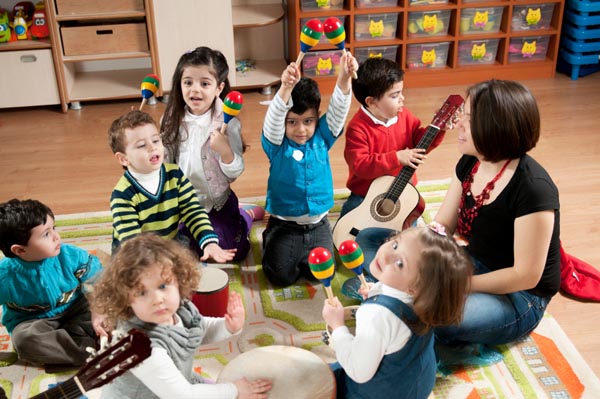How to Help Your Child Transition to Preschool

Starting preschool is a big transition for small children. Understandably, many preschoolers struggle at first, especially if they’re not used to being away from Mom and Dad. Separation anxiety is a very common problem for preschoolers, especially during the first few days and weeks. Luckily, there are some simple steps you can take to make the transition as smooth and painless as possible:
Discuss It Ahead of Time
Children often feel scared and anxious because the idea of school is completely unknown to them. What will happen to me? Will Mom ever come back? Will the teacher be mean? Talking to your child about what school is like will help the idea seem manageable, maybe even exciting.
Tell your child why you chose the school you chose, and about what fun things he’s going to be able to do there. It’s best to be vague, though. If you get his hopes up for a specific activity and the class doesn’t do it on the first day, you may have a problem on your hands. For example, instead of promising that he’ll get to play hide-and-seek with his friends, just tell him he’ll get to play. In general, be positive, upbeat, and excited for your child, and chances are he’ll pick up on your emotions and feel that way too.
Make sure you explain that you’re not going to stay there with him. This is often the most difficult part of the process: the moment when you say goodbye for the first time. Many children react with terror, crying and clinging to your leg. This is usually because they didn’t know what to expect. If you kindly and gently explain that Moms and Dads don’t go to school with their kids, and if you explain that you’ll be back in just a short time to pick them up, the transition should be a lot easier.
Object Permanence
“Object permanence” is the concept that even if you momentarily can’t see something, it’s still there. If a toy is behind a chair, it hasn’t ceased to exist. By reinforcing this concept with your child, you’ll help him get ready for that big moment when you leave him at school. Obviously, you won’t want to use the words “object permanence” with your 3-year-old, that’s a bit much. Use simple illustrations, perhaps with his favorite toy or stuffed animal. Place his teddy bear behind a book, and ask him if he can find it. When he finds the bear, say, “See, buddy? We couldn’t see your bear, but he was still right there for you. When you go to school, I won’t be right there with you, but I promise I’ll be right back for you.” This will help him grow to become stronger and more independent.
Visit the School
Bringing your child along on a site visit is an excellent way to get him excited about going to school. If your child can see the school, the classrooms, and maybe even play on the playground, his anxiety about that mysterious new “school” place might just turn into excitement and optimism.
Make sure you call the main office and arrange an appropriate time for a visit. Check to see if they have an orientation meeting for new students and their parents. Your little one may even get a head start on making new friends this way.
Social Skills
Before the first day of school, you’ll want to help your child get lots of practice with basic social skills, such as sharing, cleaning up, and saying “please” and “thank you”. If he understands these concepts before they’re expected of him in the classroom, he’ll have a much easier time and will serve as a good example for his friends.
It’s particularly helpful to have your child practice these skills with other children his age. Set up playdates and playgroups with other kids in the neighborhood, visit the local playground, or go take a fun class at the library or community center. Ideally, the kids would be going to the same preschool, but it’s not at all necessary. What’s important is giving your child an opportunity to practice getting along with other children, and acting appropriately in social situations.
Self-Care Skills
If your child struggles with basic self-care skills (potty-training, hand-washing, taking shoes on and off, buttoning up his own pants, etc.), he may feel stressed and anxious about going to school, where he won’t have you there to help him. Take time to practice these skills well before the first day of school. The more prepared he is in this area, the easier his transition will be. Of course, he may not perfectly master every little thing in time. Make sure he understands that it’s okay to ask his teacher for help, and that he doesn’t need to be afraid to do so.
Watch for Regression at Home
Even children who respond positively and enthusiastically to preschool may still show signs of stress as they transition. A common manifestation of this is regression in other areas of their life (baby-talking, for instance, or clinginess, or moodiness). This is perfectly normal. Preschoolers are incredibly bright, energetic, and curious, but they’re not great multitaskers. The switch to preschool is putting a lot of new pressures on their developing minds, and they may not adjust absolutely perfectly every step of the way.
The best way to help is by being positive and supportive. Talk to them often about what they’re doing and learning at preschool, and what they love about it. Give lots of hugs and encouragement, and make sure they know they’re loved and cared for. Provide positive reinforcement such as praise or rewards when he displays appropriate behavior, and be patient and understanding as he works his way through the transition. With your love and support, he’ll get through this time and learn to thrive.
